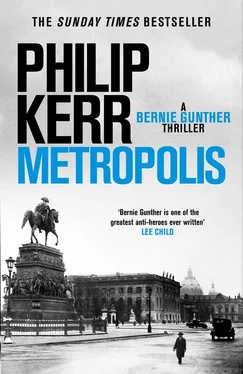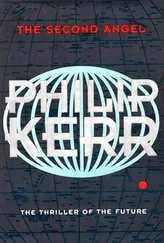‘I could tell you I’m here because I wanted to see how you are, Bruno. Because we’re Bolle boys. To see if there was anything I could do for you. But that would be a lie. The truth is, Ernst Gennat found out we’d been colleagues and prevailed upon me to come and talk to you. Not as a friend but as a cop.’
‘Hoping I might help with his clear-up rate, I suppose.’
‘Something like that.’
‘I already put out my wrists for those two whores, Elsie Hoffmann and Emma Trautmann. I don’t see how I can help any more than I have already.’
‘That would be true if they were your only victims.’
‘What makes you think they weren’t?’
‘Not me. Gennat. He likes you for another girl called Frieda Ahrendt.’
‘Never heard of her.’
‘As well as some others we don’t even know about.’
‘He’s fishing in a cold spot, Bernie. Let me tell you as an old friend. Those two women were the only ones I killed. But I suppose if I hadn’t been caught I would have killed again. Depending on my physiological state at the time.’
‘Then as a friend, let me ask you this: Why the hell did you do it? And don’t say it was because of a pre-existing medical condition. I’m not buying it. That book they found in your apartment was also covered in your own handwriting; lurid accounts of fantasy sexual murders.’
‘Which were themselves the result of my condition. But I will say this, Bernie. And you being a detective in Vice will appreciate it. At the time I killed those women, the absolute logic of what I did seemed unassailable. You can hardly deny that Berlin has been suffering from an almost biblical plague of prostitutes. Killing one or two to put the fear of God in the majority and perhaps deter them from their profession seems an effective means of control. Much better than registration and medical examinations.’
‘So it wasn’t that you just wanted to kill them for the pleasure of it, like the prosecutor said?’
‘Really, what kind of man do you take me for?’
‘It’s also been suggested by some that you may have had a partner. Another copper who agreed with what you were doing and who looked the other way. Who shielded you from arrest. At least for a while.’
‘Lots of police agreed with what I did. Surely you must know that by now. Following my arrest, no less a figure than the chairman of the Schrader-Verband, Police Colonel Otto Dillenburger, told me he fully supported my actions. Now, that’s what I call a union.’
‘I’m more interested in what police support you might have received before you were arrested, Bruno.’
‘Now, that would be telling. Let’s just say that I had my fans. I get lots of letters in here you know. From people who applaud what I did. Those who think that something has to be done to help turn the tide of filth and immorality that threatens to engulf this town. From morally minded women, too, who strongly disapprove of prostitution. I’ve even had offers of marriage.’
‘After the war there’s a severe shortage of single men, right enough. I guess you just about pass in that respect.’
‘Don’t knock it. Some of them have money. I could marry well if I play my cards right.’
‘Is that how you were able to afford to retain Erich Frey to defend you? Because someone else paid for it?’
Gerth didn’t answer.
‘And not just him. No less a figure than Magnus Hirschfeld was the physician for the defence.’
Again Gerth didn’t answer.
‘But for those two, your head would be leaking in a cold bucket.’
‘Yes. That’s true. Isn’t liberal German justice wonderful?’
After my visit I had gone to see the director of the asylum, a doctor by the name of Karl-Theodor Wagenknecht, who had the most unruly joined-up eyebrows I’d ever seen; they looked like the nest of a very large and untidy species of eagle.
‘Do you keep a record of a patient’s visitors? I’m particularly interested in those people who’ve visited Bruno Gerth.’
‘Yes.’
‘I’d like to see it if I may.’
He disappeared for several minutes, leaving me in his curious office, half of which was given over to what looked like a sort of electric chair; I decided not to enquire about it in case the doctor offered me a free demonstration. When he returned, he handed me a sheet of paper.
‘You can keep that,’ he said.
I glanced down the list. One name drew my attention immediately. It was the name of Police Commissioner Arthur Nebe.
Ever since that visit to Wuhlgarten Asylum, I’d been possessed of the idea that there was a lot more to Nebe than met the eye, and his speech to the Schrader-Verband at the Schlossbrauerei in Schöneberg had left me convinced that if there was anyone in the Berlin police who approved of ending useless or criminal lives it was Commissioner Nebe.
I closed my eyes and laid my head on my forearm, drifting somewhere in the middle of nowhere near a tall house on Nollendorfplatz. For a moment I thought I was back at the Palme, in Dr Manfred Ostwald’s office, with Stefan Rühle and Lotte Lenya and Arthur Nebe and Fritz Pabst, among several others. There were solid clues all over the place but I didn’t pick them up because I didn’t trust them. If only Ernst Gennat could learn to take his own advice. Lotte was whistling a snatch of a tune from The Threepenny Opera only it wasn’t, it was from The Sorcerer’s Apprentice , by the French composer Paul Dukas — the very tune Fritz Pabst remembered his or her attacker whistling when she was being Louise Pabst. Meanwhile, Rühle was babbling at her about a devil in white shoes whose face was covered in hair and whose eyes were red; and Nebe was making a tidy speech about cleaning up Berlin’s streets and how the Nazis were going to fix everything because nobody else could, especially not Bernhard Weiss. After a while Gottfried Nass came into the office and succeeded in throwing Weiss out the window. Then it was my turn. Two other officers arrived to help him: Albert Becker, who’d assaulted a senior officer because he was a communist; and Kurt Gildisch, who was a violent drunk given to singing Nazi party songs when he’d had a few. But Nass was the most determined of the three; like Bruno Gerth, he’d also been tried for the murder of a prostitute, albeit acquitted. None of them succeeded in my defenestration because I had the door with the wet green paint and the handprint from the Patent Office on Alte Jakobstrasse and I was able to keep it pressed shut against all three until Kurt Reichenbach came to my aid in his usual timely fashion and hit them on the head with his stick and then walked away whistling and dancing. Which pleased Brigitte Mölbling enough for her to shed some clothes and try to sit on my lap while I was still standing up, much to the amusement of Robert Rankin, who was pointing a small gun at the centre of my forehead. Meanwhile, someone was screaming in pain, and Prussian Emil was being beaten with a cane for the pleasure of the crowd from the Cabaret of the Nameless, a prospect that I, too, enjoyed, albeit from the comfort of an electric chair. Then I was briefly out of the chair and flat on the bed in Nollendorfplatz with my clothes on.
That was the last thing of which I took any notice. After this there was just the dark and silence and a general sense of impending doom.
On awakening, I felt strongly that much of this nagging vivid dream made sense. Scowling at the clock, which told me I was late, I found pen and paper and, even before I could shave and throw some cold water in my face, I hurriedly began to write, intent on preserving some memory of the dream.
I had the strong sense I was on the edge of understanding everything about the case, as if, like van Leeuwenhoek with his primitive compound microscope, I was about to see the great significance in all that was small, but at this moment I was summoned to the window by a loud commotion in the street below: a running battle between Nazis and communists that detained me for almost ten minutes. On returning to my desk, I found, to no small surprise, that though I still retained a dim recollection of what I had so clearly understood in my dream, with the exception of a few scattered words and phrases, all the rest lay hidden away in the clouds, and no amount of staring at the sky could restore it.
Читать дальше












